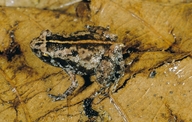|
Description
A very small terrestrial microhylid; males 13-15 mm, females are unknown. Back
is light brown to beige, usually with a teddy-bear shaped black figure, rarely
with a beige median line. Flanks dark, with a distinct border between flank
and back colouration in specimens from Nosy Mangabe. Back is without
characteristic markings in one specimen from Tolagnaro. Venter whitish, with
dark mottling on the throat. Skin on the back smooth. Tympanum rather
indistinct, tympanum/eye ratio between 1/3 and 1/2. Tibiotarsal articulation
reaches the eye. Four fingers, the inner finger reduced, and 4 recognizable
toes. Males with a distinct, largely distensible, single subgular vocal sac.
Call consists of a single, chirping note. Calls are arranged in series, which
can last several minutes. Call duration is about 64-90 ms at Nosy Boraha,
shorter at Nosy Mangabe and 225-245 ms at Tolagnaro. Call repetition rate is
30-37/min at Nosy Boraha, 17/min at Nosy Mangabe and 36 at Tolagnaro.
Frequency is 4.8-5 kHz at Nosy Boraha, 6 kHz at Nosy Mangabe and 4.7-5 kHz
at Tolagnaro.
Stumpffia pygmaea and Stumpffia tridactyla
are smaller with shorter hindlimbs. Other Stumpffia have 5 toes
(the inner toe can be reduced).
Distribution and Habitat
Country distribution from AmphibiaWeb's database: Madagascar
Terra Typica: Nosy Boraha; Nosy Mangabe; Tolagnaro. Observed at elevations from sea level to 300 m.
A common species at Nosy Boraha, in primary forest as well as in cultivated landscape. Males start calling mainly in the afternoon from the leaf litter.
Life History, Abundance, Activity, and Special Behaviors
Eggs and tadpoles are unknown.
Comments
For references in the text, see here
References
Glaw, F. and Vences, M. (1994). Amphibians and Reptiles of Madagascar. M. Vences and F. Glaw Verlags GbR., Köln.
Originally submitted by: Frank Glaw and Miguel Vences (first posted 2001-10-29)
Edited by: Rachna Tiwari and Joyce Gross (2010-07-19)Species Account Citation: AmphibiaWeb 2010 Stumpffia tetradactyla <https://amphibiaweb.org/species/2365> University of California, Berkeley, CA, USA. Accessed May 17, 2025.
Feedback or comments about this page.
Citation: AmphibiaWeb. 2025. <https://amphibiaweb.org> University of California, Berkeley, CA, USA. Accessed 17 May 2025.
AmphibiaWeb's policy on data use.
| 